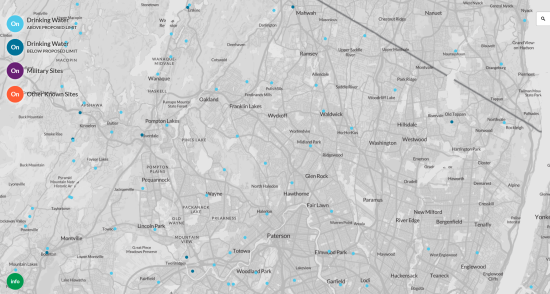
WATER CRISIS: Ridgewood, Ho-Ho-Kus, and 7 Other NJ Towns Found to Have PFAS Levels UP TO 7X the New Federal Limit—See the Full List!
the staff of the Ridgewood blog
RIDGEWOOD, NJ – Residents across North Jersey are confronting alarming data regarding the quality of their drinking water. A map published by USA TODAY, utilizing recent data submitted to the Environmental Protection Agency (EPA), indicates that several public drinking water systems in the region have PFAS (per- and polyfluoroalkyl substances) levels that exceed the new federal safety regulations.
The nationwide analysis of public drinking water systems revealed that hundreds of water sources measured “forever chemicals” well above the newly established limits, with some exceeding the maximum by as much as 86 times. In New Jersey, the situation is particularly acute in the northern counties.
What Are ‘Forever Chemicals’ and Why Are They a Concern?
PFAS are a group of manufactured chemicals used widely since the 1940s in various industrial and consumer products, from non-stick cookware to firefighting foams. They earned the nickname “forever chemicals” because they break down extremely slowly and tend to build up in the human body, animals, and the environment over time.
While studies are ongoing, the EPA states that exposure to certain PFAS may lead to adverse health outcomes. Surveys by the Centers for Disease Control and Prevention confirm that most people in the U.S. have been exposed to some level of PFAS due to their widespread use.
North Jersey Towns Exceeding the EPA Limit
Following the EPA’s 2024 ruling that established legally enforceable levels for six types of PFAS in public drinking water, testing revealed that about 46 public water systems in North Jersey have levels above the new limit.
Notably, at least nine local water systems were found to have PFAS levels “well over the limit”:
What Now? Filtration Options for Homeowners
The EPA now requires public water systems with violations to inform the public and implement solutions to reduce PFAS levels. However, homeowners looking for immediate action should be aware that not all home filters are effective against PFAS.
The EPA recommends three types of filtration systems that can be effective at reduction:
- Granular Activated Carbon (GAC): Uses carbon to trap chemicals.
- Reverse Osmosis (RO): Forces water through a thin barrier to separate chemicals.
- Ion Exchange Resin: Tiny beads act as magnets to attract and hold contaminants.
Crucial Note: While these filters can significantly reduce PFAS, the EPA is currently working with standard-setting bodies to update filter certifications to match the new, strict federal requirements. Reducing levels of PFAS in your water is an effective way to limit your exposure, even if it is not guaranteed to meet the precise new standard.
PFAS contamination in North Jersey courtesy of EWG

Follow the Ridgewood blog has a brand-new new X account, we tweet good sh$t
https://twitter.com/TRBNJNews
https://truthsocial.com/@theridgewoodblog
https://mewe.com/jamesfoytlin.74/posts
#news #follow #media #trending #viral #newsupdate #currentaffairs #BergenCountyNews #NJBreakingNews #NJHeadlines #NJTopStories

Is this a new report or an old report?
Don’t drink ridgewood water. Too many PFAS.
Drink too much of it youl turn into a democrat